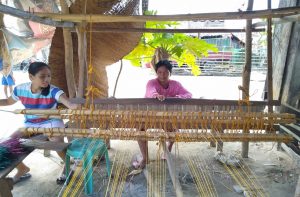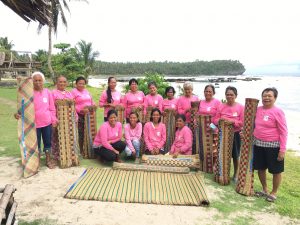One of the newfound practices introduced by the new normal is online selling. With the implementation of the community quarantine, business owners had to discontinue operations and close their establishments. In order to survive the pandemic, the business sector shifted to selling or disposing of their products and services online.
In Barangay Caridad, Pilar, Surigao del Norte, a group of elderly women bravely explored the world of online-selling in spite of not being tech-savvy to protect their precious livelihood project and support their loved ones.
Breaking the stigma
In 2018, 15 senior citizen women organized themselves into an association which they dubbed as the Caridad Mat Weavers’ Association and launched a mat or “banig” production project as their source of livelihood. This was made possible through the DSWD-Sustainable Livelihood Program – a capacity building program which aims to alleviate the living condition of disadvantaged communities by providing them with sufficient economic opportunities.
These women wanted to break the stigma of how society sees the elderly sector: ineffective and unproductive. They aim to show the community that regardless of old age, they were still capable and efficient. They have this burning desire to contribute to their families’ needs and be of service to the community.

It was only in 2019 that the association was able to commence their mat production project. Since they opened for business, the Caridad Mat Weavers’ Association would sell about 100 pieces of “petati” mats on a monthly basis. Association President Monica Ruaya would lead the peddling of their products in neighboring municipalities such as General Luna and Sta. Monica.
Locals and tourists loved buying the association’s products because these were of good quality and beautifully-woven.
Dealing with the crisis
But things went topsy-turvy for the association when the country went on lockdown. The National Government implemented strict health protocols to control the increase of COVID19 cases in the Philippines. Part of the measures imposed was to prohibit children and senior citizens from going outside their homes.
Because of this, the association was restricted from peddling their mats. The number of customers also decreased due to the travel ban. Hence, the association’s sales dropped as well.
To help the association sustain itself, SLP Project Development Officers Joe Mark Duglas and Jonas Abisia suggested that they sell their products online with the help of their children and grandchildren who were active on social media platforms. The SLP staff also helped to promote the Caridad Mat Weavers’ Association’s products online.
Through this initiative, locals continued ordering from the association. A well-off customer from another region also saw the posts online and bought 100 pieces of mats. Despite the crisis, the association was still able to get through and sustain their project.
“Sa pamamagitan ng pagbebenta naming online, naipagpatuloy naming ang aming proyekto at nakatulog pa kami sa aming pamilya kahit sa gitna ng pandemya. Malaki ang aming pasasalamat sa gobyerno lalong-lalo na sa DSWD-SLP (We were still able to sustain our project and support our family amidst the crisis by selling our products online. We are immensely thankful to the government, especially to the DSWD-SLP for their constant assistance),” SLPA President Monica Ruaya said.
As of writing, the association continues to sell their products online through the accounts of their family members. Now that the travel ban has already been lifted, tourists have also resumed buying mats from the association.
Indeed, the Caridad Mat Weavers’ Association is a team of amazing Juanas who has proven that age is just a number. Their age doesn’t make them less or incapable.
Hats off to our wonder Nanays!



